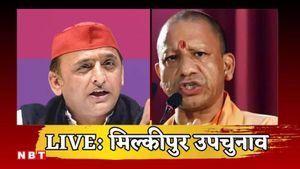The just-concluded Delhi Assembly elections have sent shockwaves through the political fabric of the national capital, marking the end of an era of dominance for Arvind Kejriwal's Aam Aadmi Party (AAP). After leading the city's administration for over a decade, the AAP faces steep losses, with the Bharatiya Janata Party (BJP) poised for significant victories across numerous constituencies.
On Wednesday, February 5, 2025, voters flocked to the polls, resulting in BJP representatives leading the charge with significant wins. By the time the dust settled on counting day, it was clear: the BJP was capturing 48 out of 70 seats to AAP's mere 22. This shift signals the party's first substantial presence within Delhi's political arena after decades of sidelining, particularly following its exit from power back in 1998.
The results have particularly stung AAP leaders, with both Chief Minister Arvind Kejriwal and his former deputy, Manish Sisodia, suffering notable defeats. Kejriwal lost his seat from New Delhi, falling to BJP's Parvesh Verma by approximately 1,200 votes. Sisodia faced a similar fate, defeated by BJP's Tarvinder Singh Marwah by just 600 votes in Patparganj. These losses not only tarnish their political legacies but also raise questions about the AAP's future and leadership.
Despite Kejriwal and Sisodia's defeats, there was one silver lining for AAP as Chief Minister Atishi secured victory from the Kalkaji constituency, defeating BJP's Ramesh Bidhuri, which offers some hope for the party amid widespread criticism and crumbling expectations. Other notable AAP leaders are experiencing mixed fortunes, with Health Minister Saurabh Bharadwaj trailing from Greater Kailash, but Education Minister Gopal Rai leading from Babarpur.
Previously positioned as the city’s political powerhouse, AAP’s promises of free electricity, water, and improved schools had cultivated significant goodwill among voters during their previous electoral victories. Their successful governance model was vigorously touted as the 'Delhi model'; yet it appears this time, the cloud of scandals, particularly related to the Delhi liquor policy case and allegations of corruption, cast much doubt on their credibility.
"The man who ruined Delhi will be destroyed," declared Congress candidate Alka Lamba, taking aim at Kejriwal amid the turbulent political climate. Although Lamba is presently trailing behind both Bidhuri and Atishi, her fiery remarks encapsulate the aggressive tone of the election, with the Congress attempting to regain its foothold after suffering significant defeats during the last two elections.
Prior to the elections, Kejriwal made bold assertions against the BJP, alleging they were applying "psychological pressure" on AAP legislators and attempting to lure them away with offers exceeding ₹15 crore and ministerial positions. The BJP, on the other hand, has categorically denied such claims, demanding AAP retract its statements under threat of legal action.
This year's voter turnout was tallied at 60.54%, demonstrating active participation from the electorate, who made their sentiments clear through votes. Despite the predictions from various exit polls—which had pointed to probable setbacks for AAP—the BJP’s sweeping wins caught many off guard, proving the projections accurate as they regained momentum after years of relentless opposition.
The fallout from this election raises significant questions concerning AAP’s future. Once heralded as agents of reform, the party now stands at the crossroads of potential renewal or decline. With the top brass having faced losses and with surviving leaders grappling with the public’s discontent, the road to recovery seems steep.
Commentators are already speculating about the political recalibration required for AAP to maintain its relevance. The recent scandals, political maneuvers, and shifting allegiances represent not only challenges but threaten to reshape the city’s political identity. Can Atishi, with her recent win, stitch together the fragmented party framework and address voters' grievances effectively?
One thing is certain—the winds of Delhi’s political change are blowing strong, shifting even the most entrenched ideals and power structures. For the BJP, the moment is ripe for reclamation, with celebrations underway as they rise once again to challenge for the future of Delhi. Meanwhile, AAP is left to introspect, reassess, and navigate through this electoral calamity. The coming weeks will reveal if the party can resurrect its former glory or if its era has truly come to an end.



